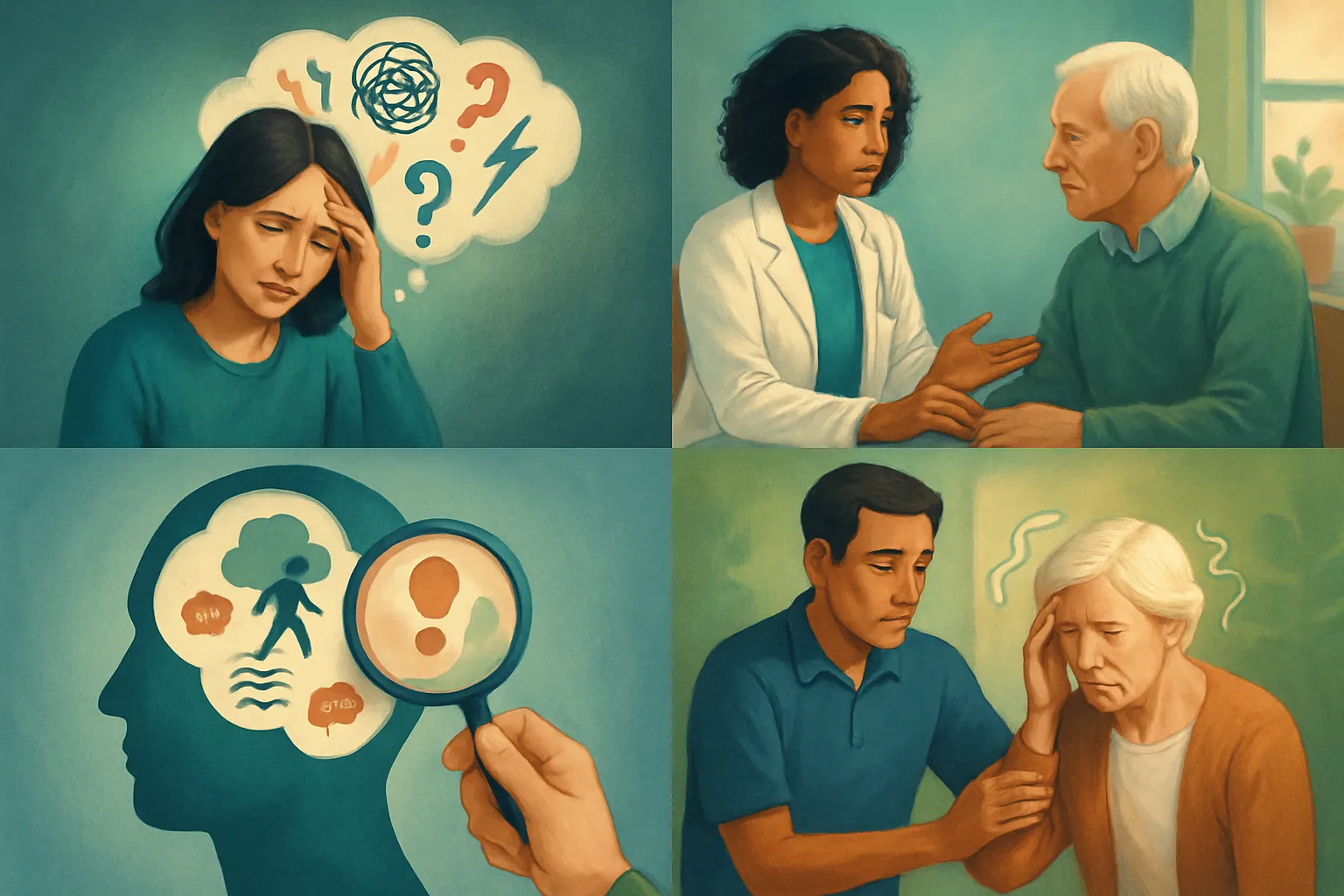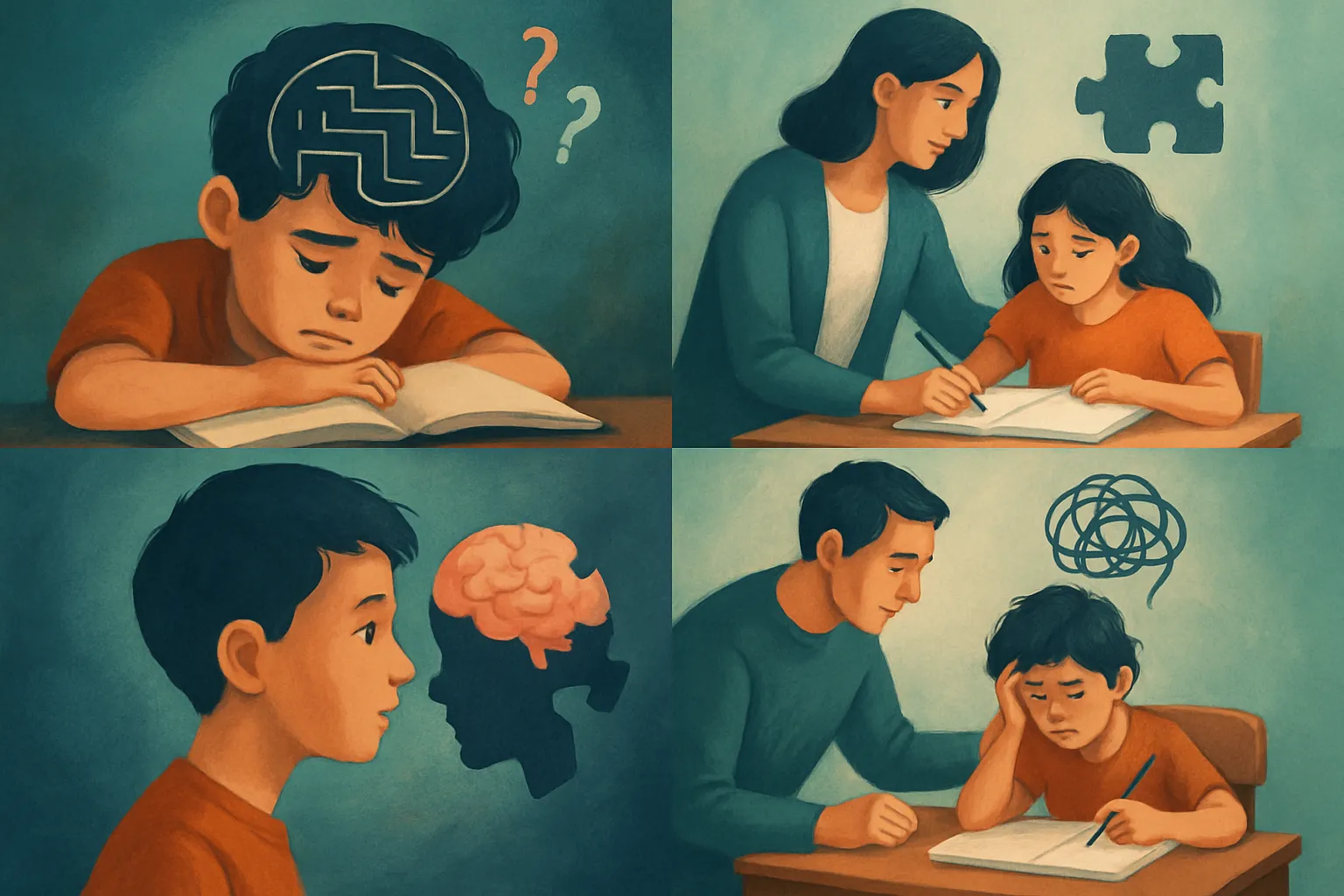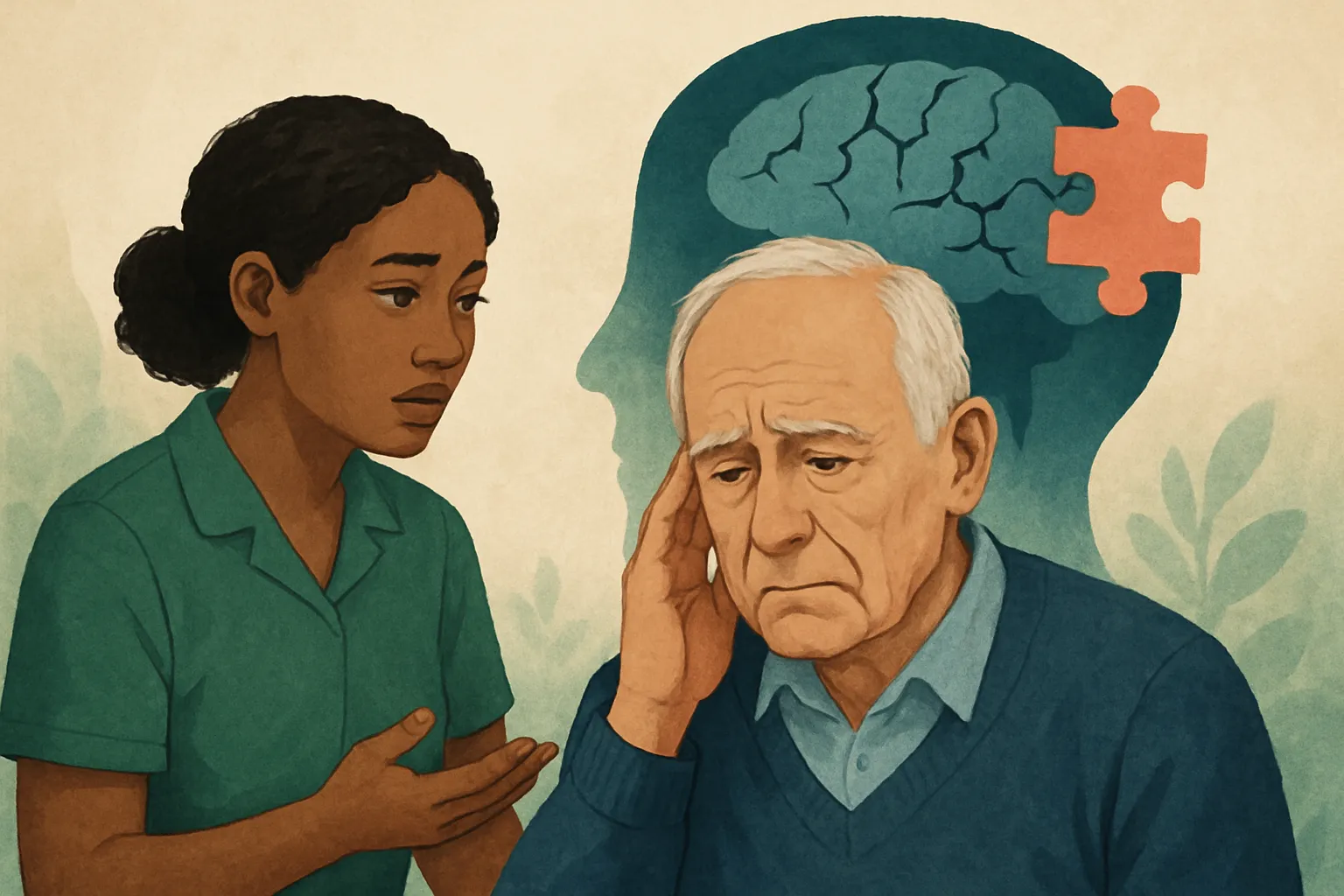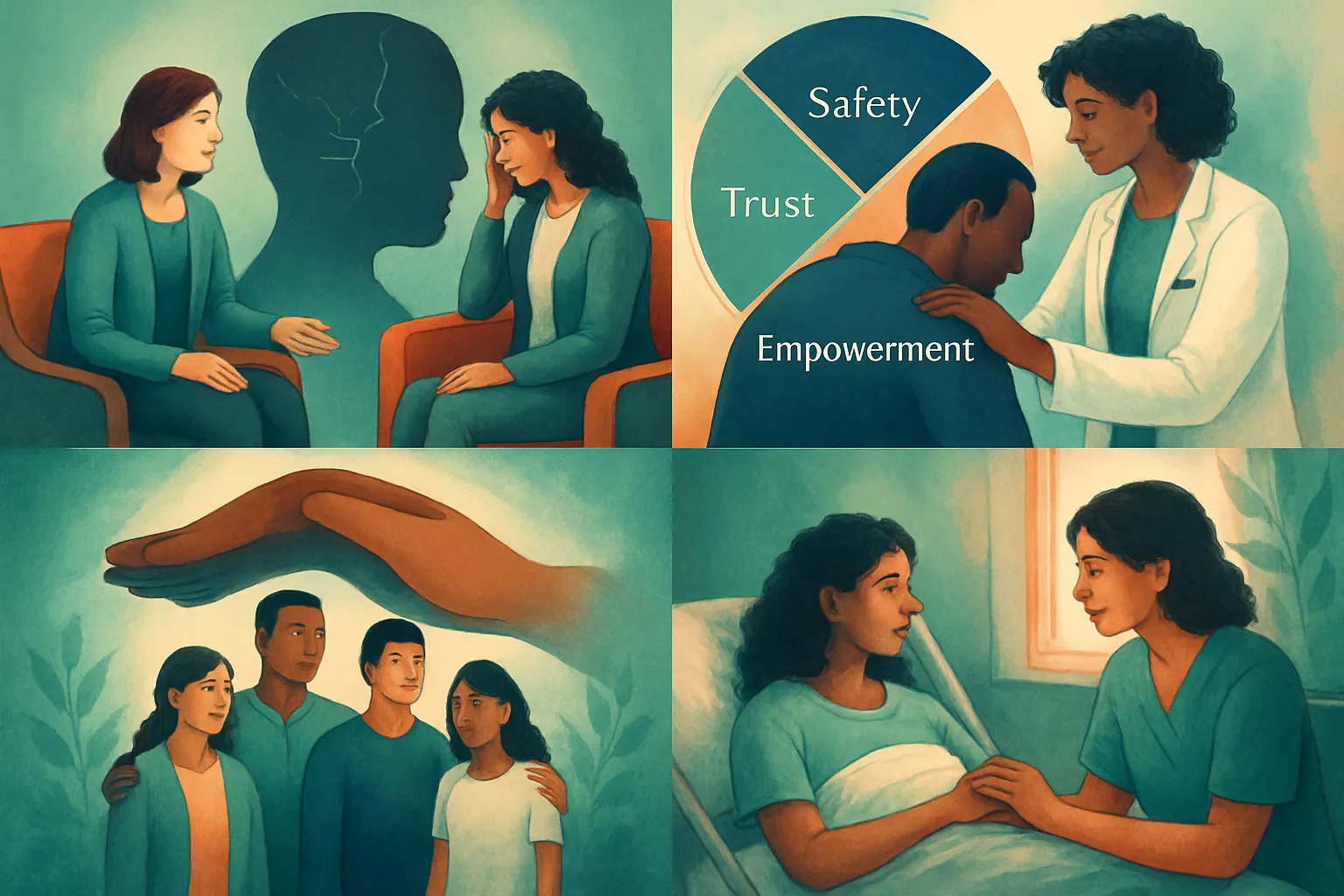Curriculum
- 15 Sections
- 15 Lessons
- 2 Weeks
- Understanding Your Role2
- Duty of Care2
- Equality and diversity2
- Person-centred care and empowerment2
- Communication2
- Privacy and dignity2
- Fluids and nutrition2
- Awareness of mental health, dementia and learning disabilities2
- Safeguarding adults2
- Safeguarding children2
- Basic life support2
- Health and safety2
- Handling information2
- Infection prevention and control2
- Understanding learning disabilities and autism2
Curriculum
Awareness of mental health, dementia and learning disabilities
Learning Objective:
Learn to recognize signs of mental health issues, support needs, and legal frameworks in care settings.
Recognizing signs and symptoms

Recognizing the signs and symptoms of mental health issues, dementia, and learning disabilities is essential for providing effective care. Early detection enables timely intervention, enhancing the quality of care provided. Important indicators include persistent low mood, anxiety, noticeable shifts in behavior like confusion or withdrawal, restlessness, poor self-care, and subtle changes in communication. Care workers are encouraged to observe behavioral changes over time. Recognising these early warning signs can help tailor immediate care strategies.
- Difficulty Concentrating
- Withdrawal from Activities
- Restlessness
May indicate underlying anxiety or cognitive decline.
Can signal depression or feeling overwhelmed.
Often associated with anxiety or dementia.
Supporting mental health needs

Supporting individuals with mental health needs requires both emotional and practical strategies to ensure well-being. Active listening and empathetic communication are central to this support, as they foster trust and understanding. Creating a supportive environment tailored to the individual’s unique context reinforces person-centred care. Support strategies are central to person-centred care; hence, it is crucial to tailor your support to each individual’s unique context.
- Observe and Note Changes
- Initiate Calm Conversation
- Documentation
- Report or Seek Support
Look for alterations in mood or behavior and document any significant changes.
Start a respectful dialogue to understand the individual’s concerns.
Record your observations and the outcomes of conversations.
If necessary, report the situation to a supervisor or seek expert advice.
Legal and ethical considerations

Delivering care while adhering to legal and ethical standards is crucial. Confidentiality, informed consent, and respecting individual rights form the backbone of effective care practices. Acting within the legal framework and ensuring ethical practice uphold dignity and respect.
- Confidentiality and Data Protection
- Informed Consent
- Duty to Report Abuse or Neglect
- Respect for Individual Rights and Autonomy
Ensure all personal information is kept confidential and secure, shared only with consenting parties.
Obtain proper consent before commencing any treatment or intervention.
Be vigilant and act promptly if you suspect any form of abuse or neglect.
Always honor the personal choices of those in care.
Understanding Mental Health

Understanding mental health is essential for providing holistic care. Mental health encompasses emotional, psychological, and social well-being, affecting how individuals think, feel, and act. Anxiety disorders, depression, and other conditions are common, with risk factors including genetics, trauma, and environmental influences. Recognizing signs like changes in sleeping or eating habits and withdrawal from social activities is crucial. Concepts such as well-being and mental resilience highlight the need for supportive frameworks in care settings.
- What is Mental Resilience?
Mental resilience refers to the ability to adapt well to adversity, trauma, or significant sources of stress. It involves maintaining a healthy mental state in the face of challenges. Factors like strong support networks, healthy coping strategies, and positive thinking contribute to mental resilience. For more details, click to explore how mental resilience can be nurtured in care settings.
Understanding Learning Disabilities

Learning disabilities within care settings refer to difficulties in acquiring knowledge and skills to the level expected of those of the same age. This includes challenges with processing information, reading, writing, and communication. Providing individualized support and employing adaptive strategies enable those with learning disabilities to enhance their quality of life and participation in daily activities. Keywords such as ‘adaptive strategies’ and ‘individualized support’ underscore personalized care.
Understanding Dementia

Dementia is a brain disorder affecting memory, cognition, and behavior, with symptoms progressing from mild forgetfulness to severe cognitive impairment. Providing care involves understanding its stages to offer appropriate interventions and support.
- Create a Calm Environment
- Use Clear Communication
- Employ Validation Techniques
- Adapt Care Plans
Ensure the surroundings are peaceful to reduce agitation.
Engage with simple, direct language.
Validate feelings and experiences without correcting perceived inaccuracies.
Modify care approaches as the condition evolves.
Promoting peer support and community engagement.

Peer support and community engagement are vital in enhancing mental health care. These approaches build trust, reduce isolation, and improve well-being. Activities such as community meet-ups, group discussions, and shared experiences are integral to fostering a supportive network. Integrated approaches lead to improved well-being through enhanced social connections and empowerment.
- Organized Community Meet-ups
- Group Discussions
Enhances social connection and empowerment.
Facilitate shared experiences and reduce feelings of isolation.
Integrating person-centred approaches in mental health care

Person-centred care in mental health involves tailoring care to an individual’s needs, preferences, and values. Respect for individual choice and collaborative care planning form the essence of this approach, fostering independence and self-advocacy.
- Assess Individual Needs
- Shared Decision-Making
- Review and Update Care Plans
- Encourage Independence
Evaluate each person’s unique requirements regularly.
Engage the individual in discussions about their care options.
Continually adapt care plans based on changing needs.
Support individuals in making their own choices whenever possible.
Understanding the impact of stigma and misconceptions

Stigma involves negative beliefs and attitudes towards those with mental health issues, dementia, or learning disabilities. Misconceptions can result in social isolation and reduced self-esteem. Challenging these beliefs and promoting accurate information are key to fostering an inclusive environment.
- Case Study: Breaking the Stigma
Explore detailed real-life examples where awareness campaigns and supportive dialogues have successfully reduced stigma and promoted inclusion. Tools to Combat Misconceptions provide additional resources for further learning.
Implementing trauma-informed care practices

Trauma-informed care involves acknowledging past trauma and providing care that avoids re-traumatization. Incorporating elements of safety, trustworthiness, and empowerment are core principles that guide sensitive interactions and foster resilience in health care settings.
- Identify Potential Triggers
- Create a Safe Environment
- Communicate Clearly
- Engage in Reflective Practices
Observe client responses to determine comfort levels.
Ensure physical and emotional safety in care settings.
Maintain transparent interactions about treatment and care.
Incorporate continuous learning and self-evaluation into routines.